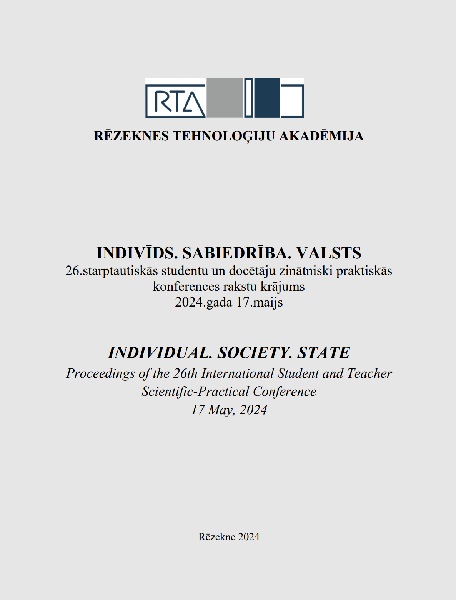EXPLORING REVENUE GENERATION MECHANISM IN MOBILE APPLICATIONS: AN ANALYSIS OF MONETIZATION METHODS
DOI:
https://doi.org/10.17770/iss2024.8345Keywords:
mobile apps, business, money generation, revenue, monetizationAbstract
These days, the world is constantly changing: various innovations, digitization, and new business models are rapidly developing in every country. However, the focus is mostly on digitization, where efforts are made to eliminate physical information providers and transfer all knowledge to the electronic space. As a result, most young entrepreneurs choose to start businesses by using mobile applications, but just a few delve into how these apps can generate income. The aim of this article is to analyze seven main business strategies to generate money, which are app sales, in-app purchases, in-app advertising, subscription models, freemium model, affiliate marketing, and data monetization that individuals can employ to generate income from mobile apps. Using the method of literature source analysis, it was determined that the monetizing method from apps depends on the purpose and type of the application, making it impossible to highlight the best income generation method. Therefore, it is crucial for young entrepreneurs to recognize that understanding how programs generate income is not only beneficial in personal life but also essential for developing business skills for the future.
Downloads
References
Ally, M., Grimus, M., & Ebner, M. (2014). Preparing teachers for a mobile world, to improve access to education.Prospects, 4 4(1), 43-59. https://link.springer.com/article/10.1007/s11125-014-9293-2
Barauskaite, G., & Streimikiene, D. (2021). Corporate social responsibility and financial performance of companies: The puzzle of concepts, definitions and assessment methods. Corporate Social Responsibility and Environmental Management, 28(1), 278-287. https://onlinelibrary.wiley.com/doi/abs/10.1002/csr.2048
Böckel, A., Hörisch, J., & Tenner, I. (2021). A systematic literature review of crowdfunding and sustainability: highlighting what really matters. Management review quarterly, 71, 433-453. https://link.springer.com/article/10.1007/s11301-020-00189-3
Deng, Y., Lambrecht, A., & Liu, Y. (2023). Spillover effects and freemium strategy in the mobile app market. Management Science, 69(9), 5018-5041. https://pubsonline.informs.org/doi/abs/10.1287/mnsc.2022.4619
Graham, C., Young, F., & Marjan, A. (2021). The generation Z audience for in-app advertising. Journal of Indian Business Research, 13(3), 343-360. https://www.emerald.com/insight/content/doi/10.1108/JIBR-08-2020-0275/full/html
Haines, J. C., & Hanssen, A. (2013). In-Application Payment from Mobile Apps: A study of In-App Payment (Master's thesis, Institutt for datateknikk og informasjonsvitenskap). https://ntnuopen.ntnu.no/ntnu-xmlui/handle/11250/253437
Holm, A. B., & Günzel-Jensen, F. (2017). Succeeding with freemium: strategies for implementation. Journal of Business Strategy, 38(2), 16-24. https://www.emerald.com/insight/content/doi/10.1108/JBS-09-2016-0096/full/html
Ivkovic, M., & Milanov, D. (2010, November). Affiliate internet marketing: Concept and application analysis. In 2010 International Conference on Education and Management Technology (pp. 319-323). IEEE. https://ieeexplore.ieee.org/abstract/document/5657647/
Jayaram, D., Manrai, A. K., & Manrai, L. A. (2015). Effective use of marketing technology in Eastern Europe: Web analytics, social media, customer analytics, digital campaigns and mobile applications. Journal of economics, finance and administrative science, 20(39), 118-132. https://www.sciencedirect.com/science/article/pii/S2077188615000256
Mattke, J., Maier, C., Reis, L., & Weitzel, T. (2021). In-app advertising: a two-step qualitative comparative analysis to explain clicking behavior. European Journal of Marketing, 55(8), 2146-2173. https://www.emerald.com/insight/content/doi/10.1108/EJM-03-2020-0210/full/html
Mora-Cruz, A., & Palos-Sanchez, P. R. (2023). Crowdfunding platforms: a systematic literature review and a bibliometric analysis. International Entrepreneurship and Management Journal, 1-32. https://link.springer.com/article/10.1007/s11365-023-00856-3
Ofulue, J., & Benyoucef, M. (2022). Data monetization: insights from a technology-enabled literature review and research agenda. Management Review Quarterly, 1-45. https://link.springer.com/article/10.1007/s11301-022-00309-1
Panda, B. K. (2020). Application of business model innovation for new enterprises: A case study of digital business using a freemium business model. Journal of Management development, 39(4), 517-524. https://www.emerald.com/insight/content/doi/10.1108/JMD-11-2018-0314/full/html
Ravoniarison, A., & Benito, C. (2019). Mobile games: players’ experiences with in-app purchases. Journal of Research in Interactive Marketing, 13(1), 62-78. https://www.emerald.com/insight/content/doi/10.1108/JRIM-06-2016-0060/full/html
Shahrasbi, N. B., Jin, L., & Zheng, W. J. (2021). Design Thinking and Mobile App Development: A Teaching Protocol. Journal of Information Systems Education, 32(2), 92-105. https://aisel.aisnet.org/jise/vol32/iss2/2/
Sharma, Y., & Sijariya, R. (2023). Uncovering the trends and developments in subscription business models through bibliometric analysis. Journal of Service Theory and Practice. https://www.emerald.com/insight/content/doi/10.1108/JSTP-02-2023-0054/full/html
Tang, J., Zhang, B., & Akram, U. (2020). User willingness to purchase applications on mobile intelligent devices: evidence from app store. Asia Pacific Journal of Marketing and Logistics, 32(8), 1629-1649. https://www.emerald.com/insight/content/doi/10.1108/APJML-06-2019-0411/full/html
Veleva, S. S., & Tsvetanova, A. I. (2020, September). Characteristics of the digital marketing advantages and disadvantages. In IOP Conference Series: Materials Science and Engineering (Vol. 940, No. 1, p. 012065). IOP Publishing Characteristics of the digital marketing advantages and disadvantages - IOPscience



